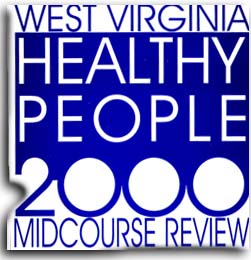 |
Food and Drug Safety |
 |
Food and Drug Safety |
Background
Every year in the United States, an estimated tens of millions of Americans develop illness from consuming contaminated food. For many, this results in unnecessary suffering and time lost from school and work. For others, especially the very young, the elderly, and the increasing number of individuals with impaired immune systems, foodborne disease can be life-threatening.
Old and emerging foodborne pathogens are widespread. Pathogens in food can only be controlled when food producers, food retailers, consumers, and regulators are aware of the potential hazards and handle food according to safe methods and practices.
Reporting of foodborne illnesses to the regulatory authorities is very poor both nationally and in West Virginia. The number of cases occurring annually in West Virginia is unknown. Timely investigation of foodborne disease is enormously important in preventing the spread of further disease. For this to occur, food service workers, managers, health care providers, and the general public must immediately report suspected foodborne illness outbreaks by calling their local health departments.
STATUS OF FOOD AND DRUG SAFETY OBJECTIVES |
|||
OBJECTIVE |
Baseline (1990) |
Midcourse (1995) |
Target (2000) |
| 12.1 Revise the Food Service Sanitation, Retail Food, and Pasteurized Milk regulations | See Objective Update |
||
| 12.2 Provide more training in food sanitation, surveillance, and safety for WV sanitarians | See Objective Update |
||
| 12.3 Perform surveys and evaluations of local health dept. food programs | No progress made |
||
In West Virginia, sanitarians are responsible for assuring safe food handling practices in approximately 11,000 food service establishments, retail food stores, food processing plants, producer dairy farms, and milk processing plants. In order to keep up with the rapidly changing technology and trends in the food and milk industries, it is important that sanitarians be kept abreast of these changes through training efforts. Also, the regulatory and enforcement tools must be kept up to date.
The regulation of prescription drugs in West Virginia is provided by the state Board of Pharmacy. However, sanitarians become involved with the sanitation of over-the-counter drugs during inspections of retail stores or after a fire or flood at a retail store.
The Objectives
OBJECTIVE 12.1 Revise the Food Service Sanitation Regulations, Retail Food Regulations, and Pasteurized Milk Regulations so that West Virginia's sanitation requirements for food service establishments, vending machines, milk plants, and dairy farms are equivalent to current revisions of the Food & Drug Administration's model codes.
UPDATE A committee of industry personnel and sanitarians has recently been created and is currently working on combining the requirements for food service establishments, vending machines, and retail food stores in a way that will be compatible with the latest edition of the FDA's model code.
OBJECTIVE 12.2 Provide additional training opportunities in food sanitation, food surveillance, and food safety for West Virginia's sanitarians that will enable them to improve the sanitation level of retail food establishments, thereby reducing the number of foodborne illnesses and complaints.
UPDATE In September 1994, a three-day food safety teleconference conducted by the FDA on "Hazard Analysis and Critical Control Points" was down linked to 12 sites in the state. Sixty-one sanitarians attended the teleconference. Sixty sanitarians attended a three-day training course in May 1996 on "Food Service Establishment Plan Review," conducted by the FDA.
Several topics on food safety were presented at the Interstate Environmental Health Seminar that was hosted by West Virginia in July 1996, and over 60 state sanitarians attended. The West Virginia Association of Sanitarians, in cooperation with the West Virginia Bureau for Public Health, produced two educational booklets in 1996 on Foodborne Diseases and Temporary Food Service Establishments.
OBJECTIVE 12.3 Perform food surveys and evaluations of all local health department food programs at a three-year frequency.
UPDATE No progress made.
Meeting the Objectives
Health
Promotion Channels Worksites |
It is imperative that all food handlers, whether producers, retailers, consumers, or regulators, be educated on the proper methods and practices of food handling and preparation. The key to containing outbreaks of foodborne illnesses, should they occur, lies in prompt reporting of suspected illnesses by food service workers and managers, health care providers, and the general public. To these ends, the health promotion channels listed in the box above are used to disseminate information and education. (A more detailed discussion of the channels is found in the Introduction.)
Objective 12.1 is currently being addressed by a committee of representatives from the retail food industry and regulatory personnel. These individuals are meeting routinely to develop up-to-date regulations for West Virginia that combine the presently used sanitation requirements for food service establishments, retail food stores, and vending machines into one code rather than the separate ones that now exist. It is anticipated that the revised regulations will complete the rule promulgation process by 1998.
Public Health Sanitation Division staff will continually address Objective 12.2 by coordination training efforts for local and state sanitarians through the Division's training officer and the WV Association of Sanitarians. Announcements of FDA, CDC, and EPA teleconferences will be distributed to sanitarians and arrangements coordinated for downlink sites. The training officer will have input into planning both the annual and midyear training courses for sanitarians.
In order to make progress on Objective 12.3, it will be necessary to re-prioritize activities of the District Sanitarians and increase District Sanitarian staff. It is necessary that District Sanitarians have more time to work with local health department sanitarians in order to achieve uniformity and accountability. Discussions between the Sanitarians Association, Office of Environmental Health Services, and the Commissioner of Public Health's office are currently being held on these matters.
Food and Drug Safety - Meeting the Objectives
Lead Entity:
WV Association of Sanitarians
Public Health Sanitation Division, OEHS
Plan
Coordinator:
Ronald K. Forren, R.S.
Public Health Sanitation Division
Office of Environmental Health Services
WV Bureau for Public Health
(304) 558-2981/FAX(304) 558-1071
1-800-922-1255